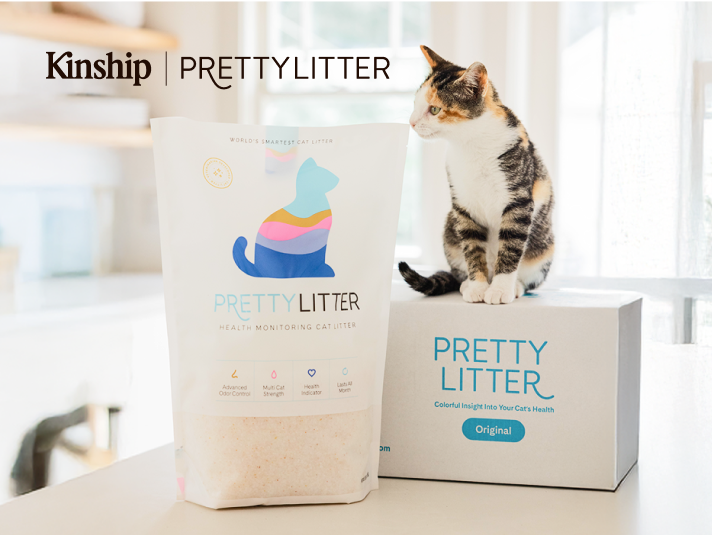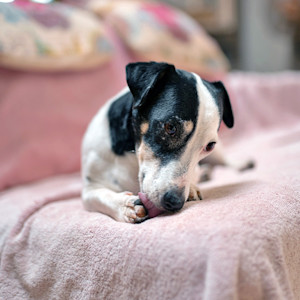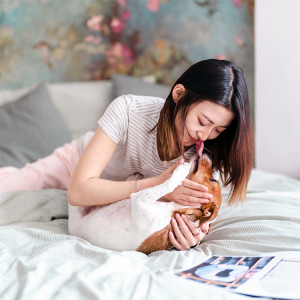Why Does Your Dog Lick You When You Pet Them? Find Out What This Means About Your Dog
What this common behavior means about your dog and you.

Share Article
In This Article:
Most Common Reasons Your Dog Licks You When You Pet Themopens in a new tab Training And Managing Licking Behavioropens in a new tab When Should You Seek Professional Help If the Licking Gets Out of Handopens in a new tab Bottom Lineopens in a new tab
If you’re a devoted pet parent, chances are you’ve been the target of an affectionate lick (or hundreds) while giving your pup well-deserved pets. But have you ever paused mid-belly rub opens in a new tabto wonder why your dog licks you when you pet them?
There’s more behind slobbery love licks than affection. Whether your dog gently laps your hand during cuddle time or enthusiastically launches into a full-blown face wash, licking is packed with meaning. It’s a blend of biology, instinct, emotion, and communication, like your dog’s version of sending a multi-layered emoji.

Save on the litter with color-changing tech that helps you better care for your cat.
Read on to dig into the most common reasons your dog licks youopens in a new tab when you pet them and what it reveals about their adorable canine psyche.
Most common reasons your dog licks you when you pet them
Affection and bonding
This one’s the crowd-pleaser: Your dog licks you because they love you. Licking is a natural way for dogs to show affection and strengthen their bond with youopens in a new tab. Just like puppies lick their littermates and mothers to express closeness, adult dogs carry this instinct into their relationship with their human family.
Studies show that licking releases endorphinsopens in a new tab in dogs, which are natural feel-good chemicals that create a sense of pleasure and comfort. It’s a win-win: you pet them, they feel loved, they lick you, and they feel even more loved.
Exploration and sensory engagement
Dogs explore the world with their mouths more than their eyes or paws. When you reach out to pet them, your scent and the feeling of connection trigger curiosity. Licking is their version of checking you out.
That lotion you just put on? The faint smell of whatever snack you had three hours ago? All fair game for investigation. Pups may be decoding your story one lick at a time. To your dog, your skin is an interactive scratch-and-sniff book with bonus cuddles.
Instincts and grooming
Licking is a behavior deeply rooted in canine instinct. According to Dr. Ushi, a veterinarian in Wesley Chapel, Florida, mother dogs lick their pups to groom them, encourage them to breathe, and stimulate bodily functions when newborns. As pups grow, they return the favor, and the licking habit becomes embedded in how dogs relate to those they love.
So, when your dog licks you while you’re petting them, they may be treating you like part of their pack, offering grooming and bonding in return for affection. They won’t try to clean your ears (hopefully), but the impulse to care for their loved ones runs deep.
Seeking attention
Sometimes, licking is a smart strategy to demand more attention. Your dog learns quickly that licking gets a reaction. Maybe you laugh, pet them more, talk to them, or give them a treat (the jackpot in dog currency). While petting them, they may lick you to encourage you to keep giving them affection. Or, if they feel ignored, they may lick you to shift your focus to them.
Dogs are excellent social learners. If licking equals interaction, they’ll use it as a tool to get what they want.
Anxiety or stress relief
Licking can also be a self-soothing behavior. If your dog feels anxious, overwhelmed, or uncertain, they may lick as a calming mechanism. It helps them regulate their emotions; they settle themselves down through repetition.
You may notice your dog licking more in new environments, during storms, or after a stressful vet visitopens in a new tab. If licking increases dramatically or seems compulsive, it could be a sign of underlying anxiety.
Taking in your scent
Your skin is a flavor-packed imprint on your dogopens in a new tab. Pups have 300 million olfactory receptorsopens in a new tab (compared to our six million) and use licking to enhance their sensory experience. When you pet them, your scent transfers to their mouth, giving them more information about where you’ve been, what you’ve eaten, and how you’ve felt emotionally. Dogs can detect changes in your hormones and health through scent, so, if your dog licks you when you’re upset or sick, they may respond to subtle shifts in your emotions and wellness.
Training and managing licking behavior
While licks may be adorable or heart-melting, it’s OK if you don’t want to be turned into a salt lick whenever you show your dog some love. The good news is that you can manage this behavior without hurting their feelings or damaging your bond.
Positive reinforcement
The key to guiding your dog’s licking habit is to reward the behavior you want and dissuade the behavior you don’t. If your dog stops licking when you gently say “no lick” or redirect their attention, immediately praise them or offer a treat. Over time, they’ll learn that calm cuddles without the tongue will get the same warm reaction. It’s about reshaping their response without punishing their instincts.
Consistency is your best friend. Mixed signalopens in a new tabs, such as sometimes laughing or sometimes scolding in response to licking, will only confuse your pup, making training harder.
Setting boundaries
It’s OK to set gentle boundariesopens in a new tab. Dogs thrive on clear communication. You can use verbal cues like “enough” or “good job,” paired with redirecting their attention to a toy or chew. Some pet parents train cues like “kiss” or “no kiss” to establish licking as an on-cue behavior rather than an all-the-time habit.
If your dog gets excessively enthusiastic during petting sessions,opens in a new tab it may help to pause affection when the licking starts. You can resume pets and rubs once they settle. This helps reinforce that calm behavior earns more attention.
When should you seek professional help if the licking gets out of hand
There’s a point where licking becomes excessive, and if your dog won’t stop licking you or themselves, it could indicate an underlying issue, such as:
Allergies or skin irritationopens in a new tab (licking paws, legs, or the air)
Pain or discomfort
Call a veterinarian or certified dog behaviorist if licking escalates into a compulsion, disrupts your dog’s daily routine, or seems linked to distress. They can help rule out medical causes and guide you toward behavior modification techniques that protect your pup’s well-being.
Pro tip: Keep a behavior journal. Track when the licking happens, how long it lasts, and what’s happening around your dog. This can provide valuable clues for professionals.
Bottom line
When your dog licks you while you’re petting them, it’s usually a blend of affection, curiosity, comfort, and instinct. Think of it as their unique love language — messy, endearing, and sometimes over the top.
While most licking is normal, you can teach your pup when and how it’s appropriate. With gentle training and positive reinforcement, you’ll find the perfect balance of tail wags and kisses to connect you both.
Next time you’re enjoying a snuggle and feel that familiar lick, smile. It means your canine loves and trusts you.
References
American Kennel Club. The Most Popular Dog Breeds of 2023. AKC, 15 Mar. 2023,https://www.akc.org/expert-advice/news/the-most-popular-dog-breeds-of-2023/opens in a new tab
Bales, Karen L., and C. Sue Carter. "Developmental Exposure to Oxytocin Facilitates Partner Preferences in Male Prairie Voles." Behavioral Neuroscience, vol. 125, no. 5, 2011, pp. 613–622. ScienceDirect,https://www.sciencedirect.com/science/article/abs/pii/S1558787811001225opens in a new tab
Ditzen, Beate, et al. "Oxytocin Improves Mentalizing—Pronounced Effects for Individuals with Impaired Social Cognition." Psychoneuroendocrinology, vol. 75, 2017, pp. 20–25. ScienceDirect,https://www.sciencedirect.com/science/article/abs/pii/S1558787816302490opens in a new tab
"Dr. Gina Ushi." PetMD,https://www.petmd.com/author/dr-gina-phillips
Palagi, Elisabetta, Giada Cordoni, and Antonella Borgognini Tarli. "Immediate and Delayed Benefits of Play Behaviour: New Evidence from Young Bonobos." Primates, vol. 45, no. 2, 2004, pp. 107–121. Goldsmiths Research Online,https://research.gold.ac.uk/id/eprint/7074/opens in a new tab

Valerie Mellema
Valerie Mellema has a Bachelor of Science in Agribusiness and Equine Industry from West Texas A&M University. She has been a professional writer for the past 20 years, covering a wide variety of pet health and care topics before founding a nonprofit focused on mental health in children and thoroughbred aftercare. She has four Border Collies and eight retired racehorses.
Related articles
- opens in a new tab
Why Does My Dog Lick the Floor?
How does that taste, bud?
- opens in a new tab
Here’s Why Your Dog Is Obsessed With Licking Your Legs
And what you can do about it.
- opens in a new tab
Why Does Your Dog Lick Your Other Dog’s Ears?
That’s cute... sort of?
![Woman lying on bed with dog, dog is looking up at the woman and licking her in the face]() opens in a new tab
opens in a new tabWhy Does My Puppy Lick My Face? (And Should They?)
And when you want to draw the line at too many kisses.
- opens in a new tab
Why Is My Dog Licking Everything? Find Out What the Behavior Means
When is it anxiety, and when are they just being goofy?
- opens in a new tab
Why Does Your Dog Lick Your Hands?
Do they just like you a lot, or is this an anxiety thing?







